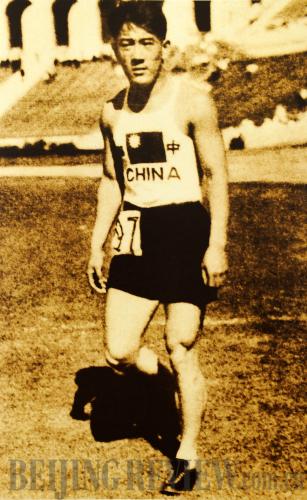|
 |
|
GREEN GAMES: Liu Hongliang, a famous scientist and the son of China's first Olympic athlete, speaks to journalists at the premiere of a documentary on Green Olympics in Beijing on August 13, 2008 (LI GANG) |
As the London 2012 Olympic Games approached, the grand event in Beijing four year ago seems even more distant in the past. But for an academician named Liu Hongliang, a commitment made at the 2008 games to promote a "Green Olympics" continues to this day.
"Green Olympics is much more than a commitment of the Beijing Olympic Games. It should be closely combined with the goal of building an ecological civilization," said Liu.
Liu is an academician of the Chinese Academy of Engineering and former President of the Chinese Research Academy of Environmental Sciences (CRAES). Aged 80, he is still guiding a number of Ph.D candidates, and is responsible for some of the country's key research projects.
A prominent father
 |
|
CHINA'S DEBUT: A picture of Liu Changchun on the field of the 10th Olympic Games in Los Angeles, the United States, in 1932. It was the first time a Chinese athlete had participated in the Olympic Games (XINHUA) |
Despite Liu's great achievements in environmental engineering, his fame is overshadowed by his father, Liu Changchun (1909-83), who was the first Chinese athlete to compete in the Olympic Games.
Liu Changchun is regarded as China's Pierre de Coubertin, who is considered the father of the modern Olympics, because he introduced China to the Olympics.
It was 1932 when Liu Changchun left for the United States to attend the men's 100-meter race at the 10th Olympic Games in Los Angeles as the sole participant from China. His son, Liu Hongliang, had been born just 13 days earlier.
That year, Japan invaded the three provinces of northeast China—Heilongjiang, Jilin and Liaoning—and attempted to force the world to recognize its puppet regime there. Without consulting him, the puppet regime announced that Liu Changchun would participate in the Olympic Games as an athlete of the "new country." Liu Changchun was furious, and promptly declared in a newspaper that as a Chinese he would refuse to participate in the Olympic Games on behalf of the Japanese and their puppet regime in northeast China.
After heeding the advice of Zhang Xueliang, a patriotic general who was stationed in northeast China, Liu Changchun changed his mind and agreed to appear on the competition field to represent China.
As the first-time athlete from a struggling country, he faced a bumpy road to the Olympics.
In 1929, General Zhang organized a track and field tournament between China, Japan and Germany, with Japanese and German Olympic athletes invited to compete. Liu Changchun won second place in the men's 100-meter race, and immediately rose to fame.
In order to provide better training for Liu Changchun, Zhang spent a great deal of money to hire a famous German athlete, then the world 5,000-meter record-holder, to be his coach.
When Liu Changchun departed for the United States, scores of his fellow countrymen saw him off at the port, which moved him into tears. He swore he would "try his best" to win honor back for the country.
However, the long journey at sea exhausted him. When he hurried to Los Angeles just one day before the game, there was no time for him to rest and adapt to the competition field. As a result, he failed to perform at his top level and missed the final.
"China was a weak country at that time. It was too lonely and helpless for my father to attend the Olympic Games alone. He could only return with deep regret," said Liu Hongliang.
But Liu Changchun's attendance was so significant for the Chinese people that he has been remembered and adored by them. According to statistics, his best 100-meter race result ranked in the world's top 10.
| 